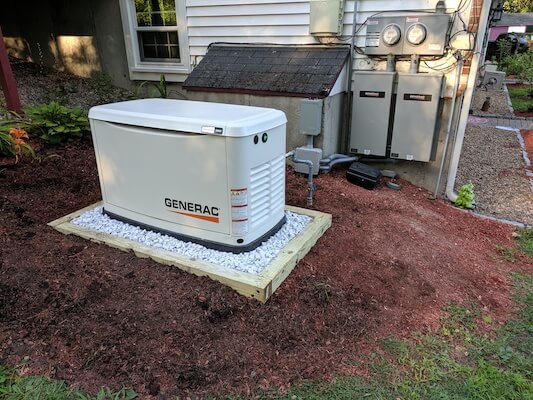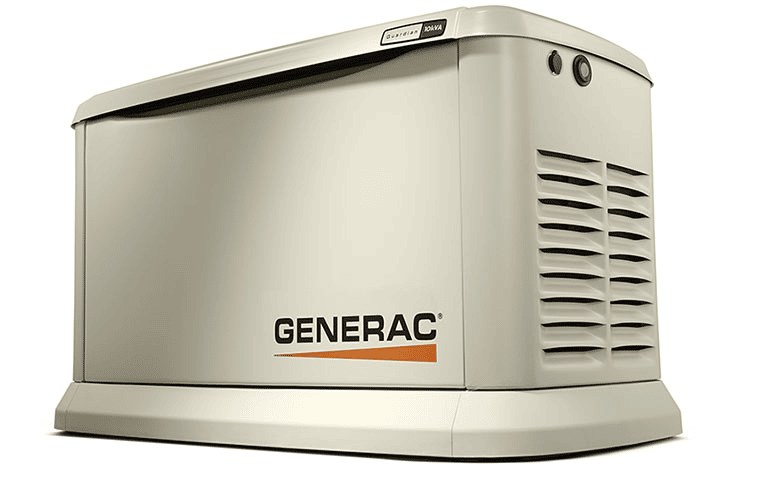Electricity is a necessity. When a power outage occurs, we realize all the little ways electricity makes an impact on our day-to-day lives.. Installing a whole-home backup generator gives you the ability to keep the power on if an extended outage occurs for any reason.
When you need it the most, a backup generator allows you to continue your daily life as close to normal as possible. A generator will prevent your food from spoiling, will enable you to turn on the heat in the winter, and run ovens and stovetops to cook food throughout the day.
While most families can live with the power being off a few hours at a time with minimal issues, imagine being on oxygen or some other medical device and being without power for a day or more. This is when a backup generator can make a world of difference for a home.
Let’s dive more into whole-home backup generators and how long they last, so you can make the best decision for installing one on your property before the next power outage.
What is a Whole-Home Backup or Standby Generator?

A backup generator is a standby utility system that comes on automatically when your regular electricity source stops. A generator connects to the electrical panel of a house or business and sits in the back of your building just like an air conditioning unit.
When the electricity goes out, a switch disconnects your building from the main power grid and triggers the generator. The generator can run on natural gas or propane. When utilities return, the generator shuts down and the switch reconnects your home to the primary power source.
How Long Does a Generator Last?
The life of a generator is between 1,500 and 3,000 hours. The more you run your generator, the shorter its total lifespan will be. Most generators can run continuously for about 500 hours. It is not advised to let the run time go longer than is needed.
In times of need, it is crucial to know how long your generator will keep the lights on, too. The answer to this question largely depends on what type of generator you have and your fuel supply. There are two types of generators: Stationary and portable.
- A stationary whole-home generator is larger than a portable one and meant to operate for extended outages. It has a larger fuel tank and connects to your electrical panel for an automatic switch-on.
- A portable generator is smaller than a stationary one, has a 24-hour fuel tank and is designed to run for days at a time. It is best to run portable generators for 8 to 24 hours. These generators may not suit your needs long-term.
The fuel you use is the other factor determining how long your generator runs. There are four main types of fuel sources used in generators: gasoline, diesel, propane, and natural gas.
Natural gas generators hook up to your gas line, so you have a supply for your generator without having to call a refueling service. If you have gasoline or propane, you should have more than one refueling company’s number available so you don’t run out.
Can You Extend the Life of a Backup Generator?
Yes, you can extend the life of your whole-home generator with regular maintenance.
When not in use during an emergency power outage, you should run your generator weekly and ensure it works correctly. This prevents moisture buildup and wet stacking. Remove any leaves, dust, snow, or debris, and schedule yearly maintenance checks with Heritage Home Service.
When in use, you must check the oil on your whole-home generator every 8 to 24 hours and give the generator breaks so the motor can cool down. This will help extend the life of your generator as well as ensure it’s ready to use without issues when you need it the most.
Signs You Need a New Backup Generator
Your generator should last a long time, but as with any equipment, it will eventually need replacing. What are the signs you need a new generator? Here’s a few of them:
- Excessive fuel usage
- Breaks down frequently
- Signs of wear and tear
- Over 25 years old
Need a Whole-Home Generator? Call Heritage Home Service Today!
Diesel, propane, and natural gas-powered generators can be lifesavers, but there are so many on the market that it can be hard to figure out the right one to suit your needs. Heritage Home Service is there to help you with this decision. Contact us today to install a whole-home generator and get peace of mind if the power goes out.

Financing Made Easy
When you choose Heritage, you can rest easy knowing that we provide straightforward options to help you budget for a complete solution that will last you for decades to come.
VIEW FINANCING OPTIONS
Complete Care Plan
With Complete Care, enjoy peace of mind knowing your home's plumbing, heating, cooling, and electrical needs are handled year after year—hassle-free, with added benefits.
VIEW PLAN







